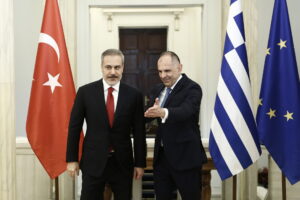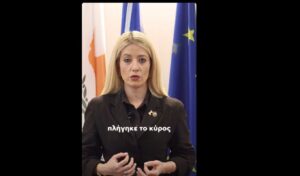The need for a comprehensive strategic approach to national issues, moving beyond the “opportunistic and event-driven approach” was emphasized by Evangelos Venizelos, speaking Monday evening at a conference organized by the S&D and PASOK MEP Yannis Maniatis on: “European Security & Defense. The Test of European Integration” at the Grande Bretagne hotel. During his discussion with the director of Kathimerini’s English edition, Athanasios Ellis, the former deputy prime minister and former PASOK president stressed that “patriotism is what I describe”, referring to the realistic approach to Greek-Turkish relations. Evangelos Venizelos commented on recent energy developments, Mitsotakis’ proposal for a five-party conference, the SAFE issue and Turkish participation, as well as the need to re-examine the national line with political consensus.
Evangelos Venizelos: “US LNG import trade agreement is significant”
Referring to recent energy agreements in Athens, the Constitutional Law professor reminded that the Memorandum for cooperation between vertical corridor countries was signed in 2016 and the agreement between natural gas transmission system operators in 2022. He also characterized as “significant” the commercial agreement for importing American LNG, but noted that it will be tested in 2030 and beyond, provided the Greek company has somewhere to resell it.
He noted as equally or more important the explorations in the Ionian Sea and south-southwest of Crete.
When asked whether the US made a “choice in favor of Greece,” Evangelos Venizelos warned: “That would be a hasty, superficial and naive view of things”. At the same time, he recalled Mitsotakis’ proposal for a five-party conference with Turkey’s participation and stressed that “we must never underestimate direct Greek-Turkish dialogue”.
The proposal for a five-party conference and Cyprus
Mr. Venizelos explained the history of the regional conference proposal, which started with Charles Michel in 2020 and was adopted by the European Council. He also noted that there was an official Turkish proposal from the UN General Assembly podium in 2020, with a letter from then permanent representative Sinirlioğlu.
Additionally, Mr. Venizelos highlighted two problems: the Cyprus problem (without Turkish Cypriot representation) and the problem of Libya’s representation.
Regarding Cyprus, he posed the question directly: “We must clarify, do we really believe in bizonal, bicommunal federation?” He warned that if the result is rejected again in a referendum by the Greek Cypriot side, we will not have much international credibility.
Greek-Turkish relations: The need for strategic awareness and territorial waters dimension
Referring to Greek-Turkish relations, Mr. Venizelos emphasized that “awareness is needed, we must look at all these things again now”, with political culture and consensus. “All developments, however important, must be placed in their position in the big picture”, he noted, emphasizing that “we must absolutely maintain the process and climate of Greek-Turkish contacts at three levels: exploratory talks for EEZ and continental shelf delimitation in the Aegean and Mediterranean, confidence-building measures and positive agenda”.
Regarding territorial waters, Mr. Venizelos mentioned that the discussion “is conducted very amateurishly”. He emphasized that “the regional conference as an idea does not include the Aegean, as Greece has not proposed a conference for the Aegean but for the Eastern Mediterranean. In the Aegean there are no other coastal countries except Greece and Turkey, and both countries have 6 nautical miles territorial waters”.
In the Eastern Mediterranean, conversely, “other countries have 12-mile territorial waters, while Greece has 6 miles, except for points where it has now extended them. Turkey also, in a large part of the Eastern Mediterranean related to Greek islands, has 6 nautical miles, without any regulatory act, but this emerges from the charts. So we have many issues to discuss, without negotiating sovereignty issues”, he clarified.
He then noted that in 2013, as Foreign Minister, he stopped negotiations on Greek territorial waters and changed three basic parameters of the national line. First, he added the Mediterranean to the discussion, so it wouldn’t only concern the Aegean. Second, he added the EEZ, so we wouldn’t only discuss the continental shelf. Third, he established multilevel dialogue as the basis for discussion.
Commenting on the Turkish Foreign Minister’s statement about territorial waters, he pointed out: “Mr. Fidan was responding about the Aegean, not about the Mediterranean”. He explained that in the Eastern Mediterranean Turkey has, without regulatory act, 6 nautical miles in a large area related to Greek islands.
The relationship with Antonis Samaras
Mr. Venizelos also referred to former Prime Minister Antonis Samaras, about whom he spoke warmly: “With Mr. Samaras we lived through a very difficult period together… We have a personal relationship, I understand him emotionally very much and I honor him”. “He is a person who honored the framework of cooperation we had in 2012,” he said subsequently.
Referring to their cooperation in the 2012 government, Mr. Venizelos recalled that when the Government was formed in summer 2012 with the cooperation of New Democracy, PASOK and DIMAR with Mr. Kouvelis, the second program and debt restructuring had already been completed. The European Union and Eurozone had committed colossal amounts for Greece.
He stressed that “New Democracy had acceded to PASOK’s policy already from November 2011, something confirmed in June 2012. Thus a government was formed in which certain fundamental issues were given”.
Commenting on his role as deputy prime minister and foreign minister, he pointed out that foreign policy was determined in agreement with other parties and the prime minister, but he exercised it himself. He then emphasized that exploratory rounds continued and he changed their framework decisively.
Mr. Venizelos also referred to the declaration on the jurisdiction of the International Court of Justice in The Hague and the International Court in Hamburg made on January 15, 2015, shortly before the elections. He also pointed out that he opened the process for Cyprus in 2014, which led to Crans-Montana in 2017.
To achieve this, he mentioned holding many meetings with Mr. Erdogan, Mr. Davutoglu and Mr. Cavusoglu, while Mr. Samaras also held meetings. He noted that the two Ministerial Councils met twice, while meetings also took place in Cardiff within the NATO Summit framework.
Regarding North Macedonia’s name issue, Mr. Venizelos recalled that his position was one name with a composite name and this was the country’s line. He pointed out that Mr. Samaras never hid his personal position, but the line of the Government and the Hellenic Republic was what he himself described. He characteristically stressed: “He may not have agreed, but he honorably maintained it”.
NATO and European security: Greece’s hybrid case
Mr. Venizelos also posed fundamental questions about Europe’s security model. “The reality of NATO is 85-15%, 85% is America and 15% is Europe and Canada, in capabilities, expenditure and readiness to assume mortal danger”, he stressed.
He warned that discussion about European security should not undermine NATO from the European side, while we fear it might be undermined by the American side.
“For us the security problem, therefore our expenditures, concerns Turkey, not Russia”, he emphasized. Conversely, Turkey considers Greece last on its threat list. He also explained the paradox: When NATO or Trump say to increase expenditures, they mean for Russia, with whom he himself negotiates without asking.
SAFE and Turkish participation
Referring to SAFE and Turkey’s participation, Mr. Venizelos stressed that the safest and most effective approach is to set terms bilaterally, that is “we to Turkey, as a European state but also as an interlocutor and neighbor of Turkey”.
Commenting on European countries’ stance toward Turkey, he pointed out that “restrictions that the American Congress and American Government consider obvious for weapons systems cannot not apply to European countries”. He explained that “America doesn’t provide F-16 upgrades and removed Turkey from the F-35 program for institutional, value-based, security and cooperation reasons with the Russian Federation”. He highlighted the paradox: “America has greater sensitivity than European countries have, whose customer we are, we are clients, because our weapons systems are predominantly German, French, Italian, Dutch”.
Asked about the Prime Minister’s position on lifting the casus belli within SAFE framework, Mr. Venizelos said he started this discussion months ago at a similar event with Alexis Papachelas. He stressed that Turkey’s participation in the new framework of European defense and European defense industry would be an opportunity to think again about a limited-scope Helsinki. He clarified that we’re not talking about defense per se, but about European defense industry.
Energy security and future scenarios
Asked about the possibility of restoring Russian gas flow after the war ends, Mr. Venizelos reminded that the American line for source diversification is not current, but from 2012 onwards, peaking in 2014.
He noted that President Trump has not said that sanctions against Russia will be eternal, and that large-scale strategic US-Russia cooperation for mineral wealth could happen.
He also stressed the need to address the institutional framework of the energy market that operates disadvantageously for Southern Europe, energy dumping from nuclear plants like Kozlodui and Akkuyu, as well as strengthening electrical grid interconnectivity.
The course of Greek-Turkish relations
Referring to the historical course of Greek-Turkish relations, Mr. Venizelos distinguished two periods: the period until Tayyip Erdogan assumed power, during which we had one crisis and one deterioration each decade (1974, 1987, 1996), and the subsequent period.
Commenting on the Erdogan era, he pointed out that this is a very long period, almost half the post-dictatorship era, which we didn’t utilize as much as we should have. He stressed that in this period, despite tensions, “we don’t have incidents comparable to those of 1976, 1987 and 1996″. Instead, he referred to incidents like migrants’ attempts to overcome the Evros fence and frigate collisions.
Asked about Turkey’s intense rhetoric and the “blue homeland” theory, he explained that over time, legally baseless political claims are added by Turkey. At the same time, exercising self-criticism, he emphasized that we too let too much time pass before taking initiative regarding Cyprus.
He characteristically noted that 8 years have passed from Crans-Montana to today, which is a long period in the 50 years of the post-dictatorship era. He added that we could have had different developments regarding Famagusta.
Closing the discussion, Mr. Venizelos reminded that Europe has Greece and the Republic of Cyprus as members and has an obligation of solidarity, for us to also have an obligation of solidarity. However, he concluded emphatically: “We must know that we are the main ones responsible for our fate and our prospects”.




